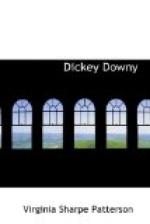“The boy grabbed them eagerly. ’My! You’re a jolly one, I’ll say that for you,’ he said heartily by way of thanks, then he ran off with a whoop.
“I saw from this action that Johnny was the same generous, kind-hearted boy he used to be, and I felt proud to have had the honor of his acquaintance.”
CHAPTER VII
A WINTER IN THE SOUTH
I was wrong about the Phoebe
bird;
Two songs it has, and both of them I’ve
heard;
I did not know those strains of joy and
sorrow
Came from one throat.
As the season advanced our May songs became less melodious until finally our music was merely a metallic but pleasant, “chink, chink,” and we knew we would soon be putting on our new fall attire, as toward the close of the summer our family exchange their pretty black-and-white suits, so much admired, for a becoming yellowish-brown one. The different flocks were also now arranging for their regular winter trip to the sunny Southland, where their winters were spent.
I was very glad to know that we bobolinks were to travel only in the daytime, as that would afford us younger ones a better opportunity to see the country. The return trip to the North is always made by night. A great many people have wondered why we do this, and those who are interested in our habits have tried to find out; but it is a secret the birds have never yet divulged, and probably never will.
The blue jays were going to remain behind, for the winters which we dreaded so much had no terrors for them. Sometimes when we were preening our feathers under the radiant skies near the Southern gulf, I thought of our old neighbors the jays, and fancied them in their bleak Northern home flitting about in the tops of the leafless trees, swayed by the icy winds from the upper lakes, and with perhaps but little to eat. I would not have exchanged places with them for the world. But my older comrades assured me the jays were not in need of my sympathy or pity. They liked the invigorating cold and chattered merrily in the desolate boughs and enjoyed many a nice meal from under the melting snow. The crimson dogwood berries, standing out like rosettes of coral, at which they liked to peck, also furnished them an aesthetic and sumptuous feast. Much more to be dreaded than the winter’s cold was the cruel sportsman, said my comrades.
The day of our departure came. The concourse of birds setting out on their annual journeys was immense, and oh, what joy it was to soar aloft on buoyant pinion high up in the blue sky, over housetops and tops of trees, skimming along above rushing waters or tranquil streams in quiet meadows. Mere existence was a keen delight. The sense of freedom, of lightness, of airiness, was gloriously exhilarating, a delicious sensation known only to the feathered tribes of all God’s creation.
Our trip took us across some densely wooded mountains, where we rested for a time. A thick undergrowth of young saplings prevented any roads, and only occasional narrow footpaths showed that people sometimes passed that way.




